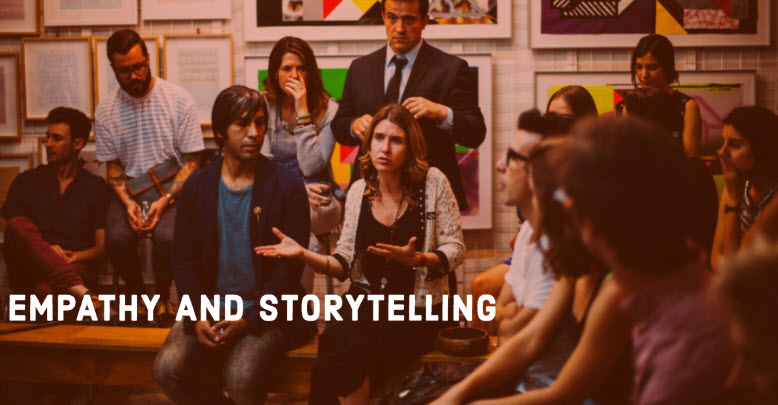Empathy and Storytelling
Improv is often explained as theater that you “make up on the fly.” Indeed, improvisational theater in a performance setting features entire stories and characters invented on the spot entirely from imagination. But improv in a therapeutic setting is deeply rooted in exploring personal stories through drama, and thus requires us to be able to share such stories. Telling personal stories in a group setting fosters empathy between the group…
Child’s Play: Life conditions us not to be silly – Improv reteaches us how
Lisa cupped her hands in the air as though she were holding a baseball. She explained to the group that she was holding an invisible ball of energy which she passed along to the people sitting around the circle. Each individual could mime an action with the invisible ball (dribbling, juggling, etc.) before passing it along. It is one of the simpler improv warm ups, but to most adults the…
I Am Somebody – An Improv Therapy Group Warm Up
It’s the first day with a new group. They may be apprehensive about being in an improv class, a recovery group session or an event they are attending . They don’t know me, and I have yet to earn their trust. I want to show them that this is going to be fun, that we’re going to laugh together. I want the group participants to know they are going to…
Improv is just fun!
Many have asked the question: why should we learn improv? And many, including myself, have answered with things like it’s good for education, useful in traveling, it’s therapeutic, etc. All of those reasons are true and fine, but there can be a much simpler, yet no less valid, answer as well. Improv is fun! Many people seem to be under the impression that in order to do something, one must…
Improv in Schools – Improv for Students
There are so many articles and studies about how teachers can use improv in the classroom to help their students, but there aren’t many discussions on how students can use improv training to help further their own education. Improv can be used in everyday class life ranging from elementary school, all the way up to university. There are many types of class activities and projects that appear frequently throughout all…
Benefits of Teaching Children Improv
A vital part of a healthy childhood is playtime, in which children band together to create a game, a scene, or even a whole imaginary world. Improv training from a young age can not only assist in the creativity involved in imaginative play, but it can also help to shape children into more confident and witty adults. They will become quick thinkers and more articulate speakers, more mature and respectful…
Categories
- Advocacy (1)
- Articulate (2)
- From the Advisory Board (1)
- Improv (13)
- Improv and Children (6)
- Improv Exercises (28)
- Improv Life Lessons (23)
- Interviews (2)
- ITG Blog (29)
- ITG Games and Exercises (26)
- ITG Podcasts (3)
- Look Who Gets It (10)
- Meditation (1)
- Neuroplasticity (5)
- Self-Care (9)
- Storytelling (3)
- Teamwork (6)
- Therapy (5)
- Yes, and (13)






